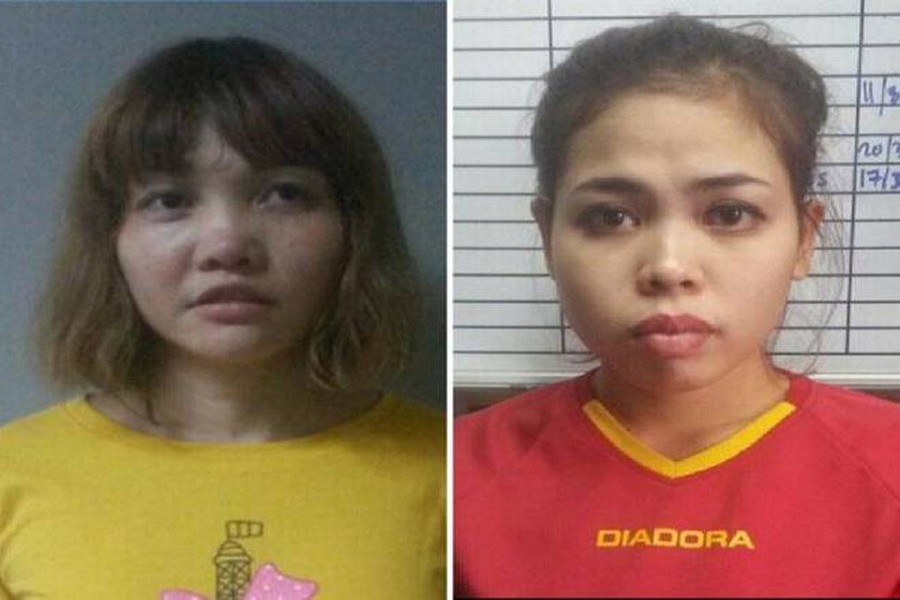Two women accused of fatally poisoning the estranged half brother of North Korea's ruler pleaded not guilty as their trial began Monday in Malaysia's High Court, nearly eight months after the brazen airport assassination.
Siti Aisyah of Indonesia and Doan Thi Huong of Vietnam are suspected of smearing Kim Jong Nam's face with the banned VX nerve agent on Feb. 13 at a crowded airport terminal in Kuala Lumpur, killing him within about 20 minutes. The women say they thought they were playing a harmless prank for a hidden-camera show.
After asking for the charges to be read in their native languages, the women shook their heads when asked if they were guilty.
The women are the only suspects in custody in a killing that South Korea's spy agency said was part of a five-year plot by North Korean leader Kim Jong Un to kill a brother he reportedly never met. Police say several North Koreans suspected of involvement left the country on the day of the attack and others were allowed to leave later in a diplomatic deal with Pyongyang.
Lawyers for two women, who face the death penalty if convicted, asked the court to compel prosecutors to identify four people still at large mentioned in the charge sheet as having a common intention to kill Kim.
"A fair trial must include the right to know," Gooi Soon Seng, Aisyah's lawyer, told the court. "The charge must be clear, not ambiguous."
Prosecutors will now start to call their witnesses, with the first few likely to be medical experts to establish the cause of death. The trial is expected to last for about two months, after which the judge will decide if there is a strong case for the women to have to mount their defense, said Hisyam Teh Poh Teik, Huong's lawyer.
Kim, who was 45 or 46, was the eldest son of the family that has ruled North Korea since its founding, yet he reportedly fell out of favor in 2001 when he was caught trying to enter Japan on a false passport, saying he wanted to visit Tokyo Disneyland. He had been living abroad for years and at the time of his death was traveling on a North Korean diplomatic passport under the name "Kim Chol."
North Korea has a long history of ordering killings of people it views as threats to its regime, though Kim was not thought to be seeking influence over his younger brother. He had, however, spoken out publicly against his family's dynastic control of the reclusive, nuclear-armed nation.
Pyongyang has denied any role in the killing and has not even acknowledged the dead man was Kim Jong Nam. It has suggested the victim died of a heart attack and accused Malaysia of working with South Korean and other "hostile forces" in blaming Pyongyang.
The trial will be closely watched by the Indonesian and Vietnamese governments, which have hired lawyers to defend the women.
Aisyah's core defense will be that she didn't know she had poison on her hand when she smeared Kim's face and was instead the victim of an elaborate trick, her lawyer Gooi said before the trial began. The 25-year-old was at a pub in Kuala Lumpur in early January when she was recruited by a North Korean man to star in what he said were video prank shows, Gooi said.
Over the course of several days, the North Korean, who went by the name James, had Aisyah go out to malls, hotels and airports and rub oil or pepper sauce on strangers, which he would film on his phone, the lawyer said.
Aisyah was paid $100-$200 for each prank and hoped the income would allow her to stop working as an escort, Gooi said.
In late January, Aisyah flew to Cambodia, where James introduced her to a man called Chang, who said he was the producer of video prank shows for the Chinese market, the lawyer said. Back in Malaysia, Chang asked Aisyah to do several more pranks at the Kuala Lumpur airport a few days before Kim was attacked. At the airport on the day of Kim's death, Chang pointed him out to Aisyah as the next target and put the poison on her hand, the lawyer said.
Police say neither Chang nor James were who they say they were. Chang was actually Hong Song Hac, one of four North Korean suspects who left Malaysia on the day of the killing, while James was Ri Ji U, one of another three North Koreans who hid inside their country's embassy in Kuala Lumpur to avoid questioning.
Those three were later allowed to fly home in exchange for nine Malaysians allowed to leave Pyongyang in a deal easing the countries' diplomatic tensions. Gooi said James was key to Aisyah's defense and that his absence could weaken her case.
Aisyah, who has a son, has wrote to her family and told them to pray for her "so that the case will be over soon and I can go back home."
The 29-year-old Vietnamese suspect Huong was caught on airport security surveillance camera wearing a white sweatshirt emblazoned with the big black letters "LOL" — the acronym for laughing out loud. Little is known about her. Raised in a rice farm in northern Vietnam, her family said they had hardly heard from her since she left home a decade ago.
She made postings on a Facebook page under the name Ruby Ruby, according to her niece, Dinh Thi Quyen.
Photos on the page show Huong wearing a white shirt that says "LOL," like the one seen during the attack. It shows her posing for selfies in January in Cambodia and in Kuala Lumpur a few days before the attack.
Her last post was on the morning of Feb. 11, two days before the attack, from an area near the airport.


